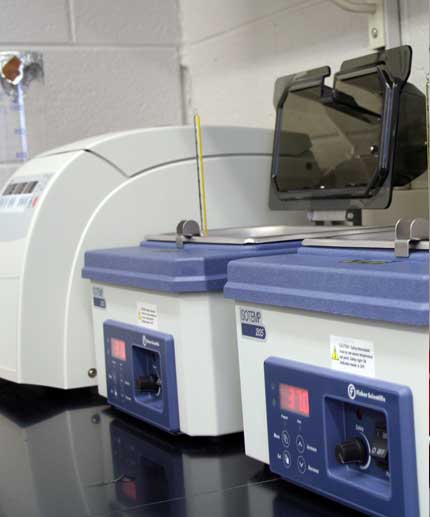Prevention & Maintenance Procedures
 This summary list is intended as a guide for common routine maintenance and cleaning. It is not necessarily comprehensive. Special situations and other details should be discussed with the Director. Safety matters, technical policies and procedures, and other related issues are not listed or discussed in this guide. See the Director and/or the appropriate documents or protocols for other details.1
This summary list is intended as a guide for common routine maintenance and cleaning. It is not necessarily comprehensive. Special situations and other details should be discussed with the Director. Safety matters, technical policies and procedures, and other related issues are not listed or discussed in this guide. See the Director and/or the appropriate documents or protocols for other details.1
To be Performed Daily
- Check incubator temperature readings and confirm with calibrated thermometer. Record and report anomalies.
- Clean and disinfect hood work surfaces before and after every manipulation.
- Clean and disinfect bench and work surfaces, pipetting devices, drawer and cabinet handles, and the outside of centrifuges.
- Disinfect, empty, and clean aspirator flasks and tubing after every use. Aspirator assemblies are not to be stored in hoods and fresh bleach (50ml to 100 ml) must be left in the flask(s) at the end of the workday.
- Biohazard bags must be processed (decontaminated) and new empty bags left in the receptacles at the end of the workday, if full. If not full, the bags may be twisted or folded closed and opened and used the following day. However, every Friday, regardless of the amount of waste in the biohazard bags, they must be sealed and processed for decontamination. Under no circumstances may bags be retained with any materials in them over the weekend in the laboratory areas.
- Sweep floors as necessary at the end of the workday but at minimum every Friday before leaving for the day.
To be Performed Weekly
- Check incubator CO2 readings and confirm with Fyrite Test. Record and report anomalies.
- Disinfectants (70% ethanol and 1% benzalconium chloride) must be made fresh weekly or more often as needed. (Mondays)
- Water baths must be completely emptied and cleaned. (Mondays)
- Incubator humidification pans must be emptied and cleaned. (Mondays) The water to be replaced in water baths and incubator humidification pans should be either fresh low hardness city treated tap water or distilled deionized water. In either case it must be autoclaved. Also, to the water add benzalconium chloride (dilute the 1% working solution 1:50 to 1: 100).
- Disinfect and clean centrifuge rotors, carriers, and inserts using 70% ethanol for initial disinfection, mild soap and water for cleaning, and 70% ethanol for re-disinfection before reassembly. Lightly lubricate the rotor pins and rotation points on all swinging bucket carriers. Discard and replace all centrifuge balance tubes and/or bottles.
To be Performed Monthly
- Clean incubators monthly (or immediately after ANY evidence of contamination of ANY cultures). Remove all shelves and side supports, autoclave these parts and the humidification pans, wipe the rest of the chamber with 70% ethanol and 1% benzalconium chloride, allow fumes to dissipate, reinstall shelves and humidification pan. Allow chamber to equilibrate overnight, check the CO2 and temperature, and disinfect the outsides of any culture vessels returned to the incubators.
- Clean hoods. Remove the work surface and the front and rear air intake grills. Clean with soap and water, disinfect with 70% ethanol and 1% benzalconium chloride, clean under the work surface (the bottom of the hood plenum) similarly, clean and disinfect the rear and side interior walls of the hood, clean the glass sash (front and rear), reassemble, and re-disinfect the interior work surfaces. Allow two hours prior to resuming work in the cleaned hood(s).
- Mop floors with dilute hypochlorite (bleach diluted 1:500) using a mop with a disposable head.
To be Performed every Six Months (more often as special situations require)
- Have the air flow rate in hoods checked and adjusted as necessary.
- Change the filters in the nosepieces of all pipette aids (or immediately after actual or suspected aspiration of any fluids into the nose piece).
To be Performed Annually
- Have all hoods certified.
- Change incubator in-line filters, CO2 lines and air lines (if equipped).
Other Notes and Schedules
- No items, period, may be stored in hoods.
- Class II, Type A hoods (the air blowers) should be left on 24 hours a day.
- All waste containers or receptacles used in hoods during media preparation or cell culture manipulations must be sterile.
- Pipettes used in the TCF must be single use, disposable, individually wrapped unless specific authorization for the use of glass reusable pipettes is granted by the Director.
